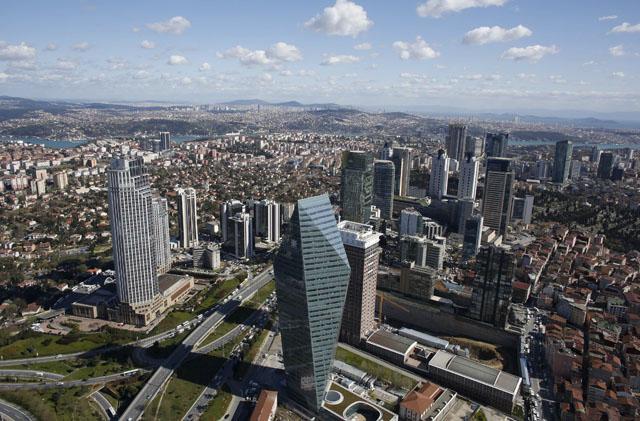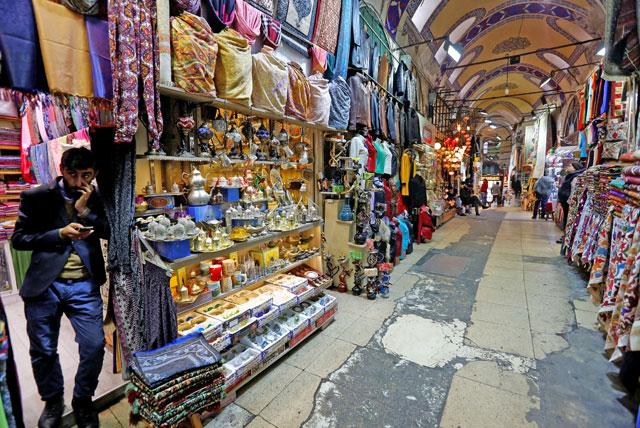You are here
Istanbul's financial hub goal hampered by lightweight stock market
By Reuters - Apr 13,2015 - Last updated at Apr 13,2015

ISTANBUL — Turkish President Recep Tayyip Erdogan dreams of transforming Istanbul into a financial hub that can rival Dubai or Singapore, but first he needs to win over would-be investors like Ali Bahcuvan.
"I'd rather stay away from the stock market these days," said the 41-year-old internet entrepreneur. "The cost of trading has increased and that has hurt liquidity. The stocks I want to trade are all illiquid."
Market participants say interest from small investors is on the wane, thanks to higher fees and as new flotations fail to spark interest.
That's bad news for an exchange that relies on retail investors for much of its liquidity. It also raises questions about the viability of the government's drive to make Istanbul a global top-10 financial hub.
Years of solid growth have turned Turkey into a major emerging economy, but its equity market has not kept up.
The government has already introduced some regulatory changes to make Istanbul more attractive for foreign capital, including an ambitious plan to build a $2.6 billion "International Finance Centre".
But investors say more needs to be done, especially given flagging growth and nagging political worries ahead of June parliamentary elections.
"Right now, Turkey is — without much doubt — not one of the favourite emerging markets," said Mike Harris, Turkish strategist at Renaissance Capital. "That also enhances the challenge for Istanbul to be perceived as a financial centre because the economy is going through these doldrums."
Ankara needs to encourage more public listings, more equity issuance and more "truly public" companies, analysts say, especially since many listed firms are still controlled by the government or their founding families.
Erdogan has hardly helped investor sentiment, fulminating against high interest rates in comments which have raised concerns about the independence of the central bank.
Political worries
"Valuations are attractive but there are uncertainties regarding the management of the economy after the elections," said Didem Gordon, chief executive of Ashmore Portfoy, an asset manager.
This year should have been "spectacularly positive" for Turkey because of the lower oil prices, Gordon added, but emerging market volatility and domestic politics have weighed on the markets.
At around $220 billion, Istanbul's stock market is the world's 29th largest, well behind some emerging market rivals. The Johannesburg market is worth more than four times that, even though South Africa's economy is less than half the size of Turkey's.
"There is a mismatch between the complexity and size of the Turkish economy and the size of its capital markets," consultancy Oliver Wyman said in a 2014 report, adding that the equity market could easily double in size.
Trade is concentrated on just a handful of companies, with just ten stocks accounting for 70 per cent of transactions. Many smaller companies aren't liquid enough to draw investors.
Retail investors account for 80 per cent of the trade on Borsa Istanbul, but their numbers have thinned after the bourse, which plans to list by next year, hiked its fees. Brokerages are also charging more to offset new capital requirements.
"There has been a significant increase in fees that have hit both brokerages and investors," said Metin Ayisik, the head of Turkey's brokerage industry group.
Last year, Istanbul's investor base shrank by 5 per cent to around 1 million investors, he added, noting that the bourse needs around five times that to ensure liquidity.
Istanbul is also hobbled by a buy-side industry which is small, even by emerging market standards. By contrast, South Africa has scores of money managers centred in Cape Town.
According to Oliver Wyman, Turkey could build up the buy-side industry by encouraging the engines of the economy, small and medium-sized companies, to go public.
There have been some positive signs, such as recent government incentives for retirement savings, which have boosted demand for private pension funds. But the government still needs to do more to encourage savings.
"A lot needs to change in terms of creating a strong domestic pool of assets, because then companies come to where the savings are, assuming the regulation is supportive," said Renaissance Capital's Harris. "The perception of Turkey can change on a dime if the policy makers aggressively embraced reforms."
Related Articles
ISTANBUL — Turkish businessman Tekin Acar had contracts to open branches of his leading cosmetics chain in ten new shopping malls this year.
ISTANBUL — Turkish conglomerates are racing to add high-end apartment blocks and office towers to Istanbul's rapidly changing skyline, turni
ISTANBUL — If former Turkish prime minister Binali Yildirim wants a reminder of how much he needs to win as Istanbul mayor in this month's e


















